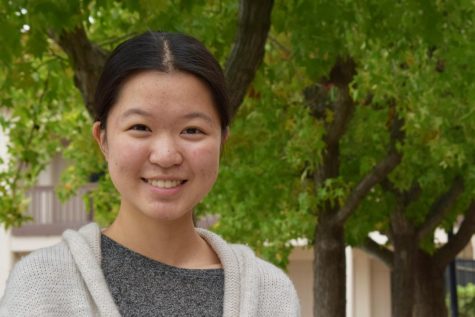Language Department: Drawn to the spotlight
October 20, 2017
At her Catholic elementary school, a girl with blue eyes and blond hair consistently portrayed Virgin Mary in their school plays. Spanish teacher Maria Autran was greatly confused about the casting, because to Mexicans, she says matter-of-factly, Virgin Mary looks Mexican.
Yet Autran was simply too tall to play the part, the nuns at her school said, and her dark hair displayed not a hint of the proper blonde they were looking for. Despite the discouragement, Autran was inevitably drawn toward the spotlight on the center stage, and she later withdrew from the Catholic school in favor of a public institution with double the amount of kids.
She recalls a particular teacher, young, fresh and attentive in the teaching profession, who possessed a distinctive flair for unearthing the talents in each of her students. Autran characterizes her as especially caring, with a kind of distinct energy and desire to “do something good” and influence the world. In contrast to the productions of the Catholic school, every student was given equal opportunity to audition for roles in the play. Although, Autran concedes, the teacher ultimately picked whoever she personally believed would best embody the personality of the character and memorize lines with ease. Nevertheless, Autran was eventually selected to play the role of a literal “country,” in which she recited a poem for a particular Mexican holiday the play celebrated.
Thusly encouraged, Autran auditioned for every play afterward.
“I was given a chance to perform, but it’s [like] something like I said … You always want to play piano [for instance],” Autran said. “You know you like [it], [and] you have something in you that’s always kind of calling you.”
Throughout elementary and high school, she envisioned her future career as an actress and planned an ambitious future. Letters of recommendation, transcripts and the desire to travel at ready, Autran set her sights on the other side of the world — studying drama in Russia. Her parents, unfortunately, forbade her to leave, cautioning her of the foreign and unfamiliar socialism that was prominent in Eastern Europe around 1987.
“[My parents] said, ‘No, this is not the country where you should [study] even if you love drama,’” Autran said. “‘Do it here, not in Russia, because who do you know there?’”
Autran ultimately came to America to study instead, a decision she was satisfied with as it still fulfilled her desires for travel. She attended several acting classes, but found it especially challenging to audition for roles outside of her university. Casting was much more selective and stereotypical American English was preferred over her Mexican accent. Shortly after, Autran determinedly told herself she would work to reduce foreign tones in her English.
Set design and lighting were certainly areas for her to explore, yet her passion dwelled in a position on the stage itself, directly in front of the watchful eyes of the audience. Perhaps it simply wasn’t her time, and she told herself she would simply accept what the future had in store for her, regardless if acting was involved.
Theater, however, forever lingered in the back of her mind.
“You just have to find a way to do it or [a] strategy,” Autran said, “and I think everything is possible if you have a dream. You have to make it happen, not just have it in your head but make it happen.”
This kind of mentality solidified as the years passed. Before, she constantly experienced states of disappointment and discouragement whenever her auditions reaped no congratulatory response. However, after taking her own students to watch a Spanish play she especially liked, her passion for acting was revived and she found herself, along with around 10 other women, auditioning for the role of Cesar Chavez’s mother for the play ‘Let the Eagle Fly,’ a production detailing the life of Chavez’s leading role in the civil rights movement of Mexican-American labor. Her husband had warned her to anticipate disappointment, but the outcome was one of complete happiness instead: she had been selected.
“I got excited as if I was a 20 year-old woman. I said to my husband, ‘I got cast for the play and I’m going to be the mother,’” Autran said. “There was a little bit of singing and dancing and I got pretty excited.”
Fast forward 10 years later, Autran is still performing in Spanish and Mexican-American plays around the Bay Area, although she occasionally reminisces of her earlier setbacks. When she broaches the subject with her theater colleagues, their reply is harsh and unflinchingly realistic, as they tell her the misfortunate responses were inevitable.
“They say, ‘Oh, you were auditioning for white plays, that’s why nobody paid attention you know,’” Autran said. “… it can be … kind of harsh, but in a way, true.”
Ironically, Autran had been selected to play the role of Chavez’s mother because of the uniqueness of her Mexican accent, which she had forgotten to adjust over the years — certainly a stroke of good fortune.
“People would say ‘Why do you want to get rid of your accent?’” Autran said. “‘That’s part of you and maybe you’re [a] fine character.”

















